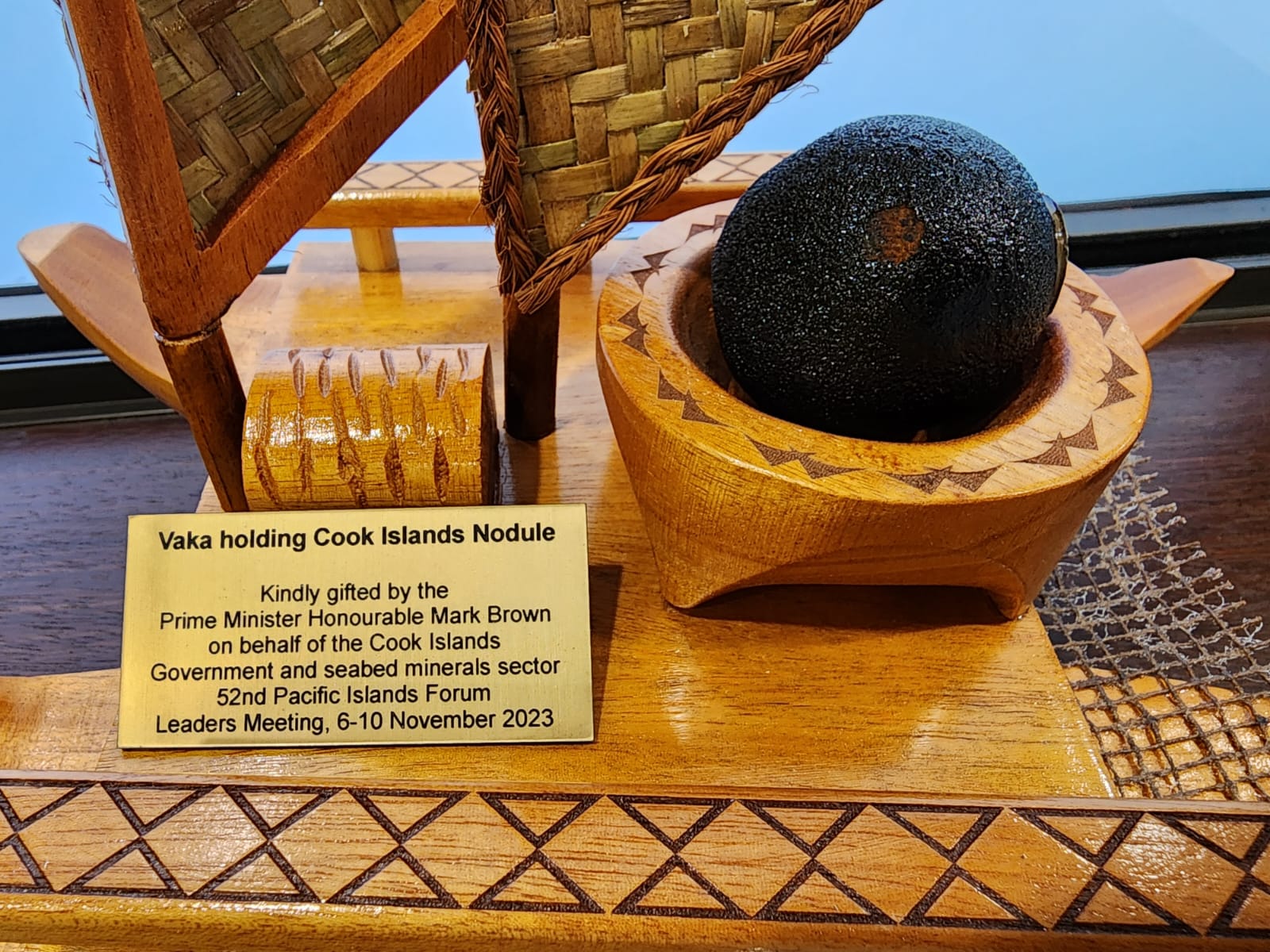Te Ipukarea Society: The radiating depths of our Marae Moana
Saturday 2 December 2023 | Written by Te Ipukarea Society | Published in Environment, National

Pacific Islands Forum leaders who attended the Leaders Meeting in Rarotonga last month each get a seabed nodule to take home as a momento. Nic Maclellan/23120116
Scientists raise alarm over radioactivity risks in polymetallic nodule mining Is the radioactivity of polymetallic nodules an problem? The simple answer to that question is, we do not know. Yet.
Polymetallic nodule mining is a controversial subject in the Cook Islands, and increasingly accross the globe. Te Ipukarea Society has been campaigning against the speed with which the Government, supported by the mining companies, have been pushing ahead with this industry. We are told not to worry, and that Government will not let mining go ahead if the damage it causes will be too great. Meanwhile Government’s actions suggest a different story. It appears to us that most of the Prime Minister’s trips around the world over the past two years have had the primary objective of promoting to the world that we will soon be open for nodule business.
While we acknowledge nodule mining is a potentially very lucrative industry, it is also potentially a very disatrous one for our future. The environmental and health risks associated with nodule mining are very poorly understood, with new threats coming to our attention as time passes. Quite recently a new risk associated with nodule mining was identified – radioactivity.
In a paper published in the peer reviewed journal Scientific Reports, it was reported that polymetalic nodules contain naturally occurring radioactive materials (NORMs). These are mostly uranium, thorium, and their decay products. These radioactive elements emit ionising radiation, which can damage DNA and increase the risk of cancer. The concentration of NORM in the nodules varies depending on the location and specific composition of the nodules.
Some of the potential risks of radioactivity associated with nodule mining have been identified as:
- Occupational Exposure: Workers involved in mining activities, such as nodule collection, processing, and transportation, may be exposed to NORM through inhalation, ingestion, or external exposure. During the preliminary processing and drying on the mining vessel fine particles can reach into the deep lungs of the workers and remain there. There, they can damage cells, and thus, impose a great radiological hazard for the human body This exposure could increase their risk of developing radiation-induced health effects, such as cancer.
- Environmental Contamination: The release of radioactive materials during nodule mining activities could contaminate the marine environment, potentially affecting marine organisms and ultimately reaching the human food chain.
- Public Exposure: Radioactive materials released during nodule mining could also spread to coastal communities and beyond, potentially exposing the general public to radiation.
- Accumulating in the food chain: Residuals from the mining slurry (mixture of seawater, sediment and nodule dust) are released back into the ocean as a discharge plume. Radioactive particles from the plume can be ingested by marine organisms and may enter the food chain and ultimately be ingested by humans.
The risk to human health is said to increase if nodules are kept in confined spaces. People may need to take more care when storing these in their office and homes, or when transporting them. We really hope somebody told Pacific leaders this before they carried their gift of nodules back home with them after the Forum!
Projected on large-scale mining operations, there could be a serious radiation risk if the nodules are stored in enclosed spaces such as in bulk carriers for transportation to shore based processing facilities.
While deep seabed mining holds the potential for economic benefits, we need to take more time to carefully consider the potential risks, including those associated with radioactivity, on our health and on our environment.
The Science Reports study showed that the anticipated nodule mining procedure could threaten occupational and public health. This would be through the inhalation or ingestion of radioactive nodule dust and radioactive gas, potentially through the marine food chain and possibly also during metal extraction on land.
None of these risks are covered in current seabed mining legal frameworks, either within the Cook Islands or in international law. The implications are vast and we continue to lobby the Government to assess all these risks thoroughly before steamrolling ahead with this industry.












































